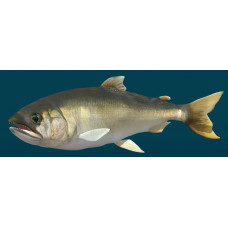Latin name
Plecoglossus altivelis
Other names
Ayu, sweetfish.
Identification
Vertebrae: 60-63. Blind gutters 350-400. Has small leaf-shaped teeth loosely attached to the jaw by two ligaments. The body is slender and elongated. The head is large with a relatively large mouth. Scales are small.
Features of fish fins
Dorsal rays: 0. Dorsal soft rays: 10-11. Anal soft rays: 14-15. Dorsal fin above pelvic fins.
Fish colouring
The back is dark green with a white belly. There is an orange patch behind the gill cover. All fins are bright yellow, the upper jaw is white, the lower jaw is green and the upper edge of the eyes is orange.
Distribution
The range is restricted to the northwestern Pacific coast from Hokkaido to Vietnam. A few inland populations also inhabit lakes in Japan, such as Biwa.
Habitat
Marine, freshwater, brackish, bottom dwelling, amphidromous, subtropical species. Depth range from 10 m. Movement between coastal marine waters and freshwater lakes.
Size
Body length 30 cm, maximum length 70 cm. Maximum age: 3 years.
Behavior
Inhabits the sea, spawns in rivers. They live in schools.
Food and feeding habits
It feeds mainly on algae, but also on plankton, invertebrate larvae, crustaceans and worms.
Reproduction
During spawning, some fish migrate upstream and others spawn on the bank above the gravel. It spawns at night and digs a hole 10 cm deep. The eggs are about 1mm in size and remain on the sand or pebbles for 14-20 days before hatching. This fish is semi-fertile and will lay many eggs in a short period of time, releasing about 10,000 eggs each time. Sometimes females that want to spawn but can't will conserve their energy and move to deep standing water. These females wait until spring before travelling upstream with their young. After hatching, the larvae grow to 6mm and swim upstream to feed on plankton. The juveniles return to the river in the spring. When schools of Plecoglossus altivelis return to their river, they defend their territory and feed. Large females spawn once, while smaller females spawn twice at two-week intervals.
Fishing
It has cult status in Japan and is one of the elements of traditional Japanese fishing, dating back to the Middle Ages.
Relationship with a person
In East Asia, fish flesh is prized for its flavour. Fish are farmed artificially.
| Classification | |
| Phylum | Chordata |
| Class | Actinopterygii |
| Squad | Osmeriformes |
| Family | Plecoglossidae |
| Genus | Plecoglossus |
| Species | P. altivelis |
| Features | |
| Conservation status | Data Deficient |
| Habitat | Bottom |
| Life span, years | 3 |
| Maximum body weight, kg | No information |
| Maximum length, cm | 70 |
| Sailing speed, m/s | No information |
| Threat to people | Edible |
| Way of eating | Planktonophage |
Ayu sweetfish
Tags: ayu sweetfish



